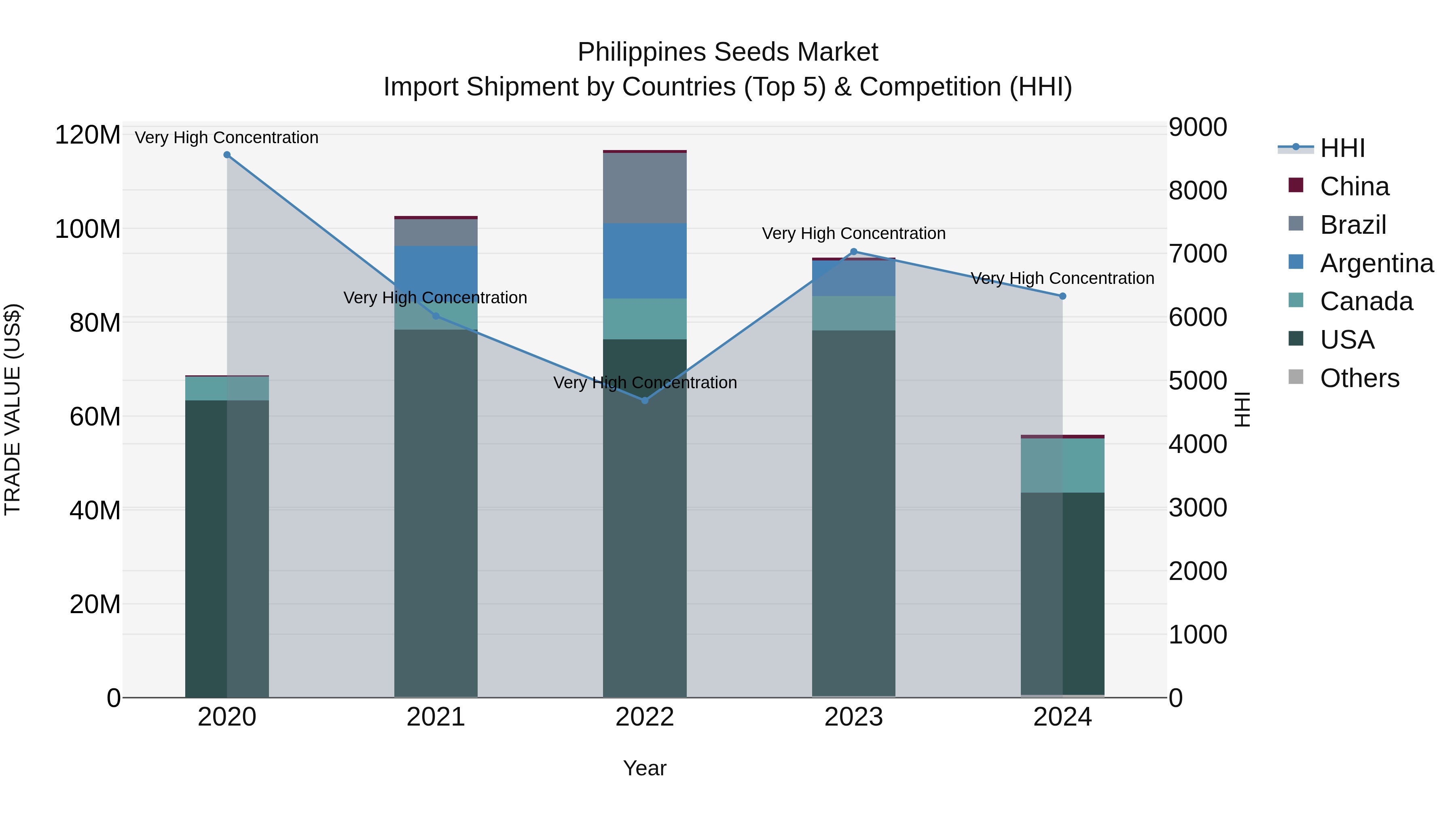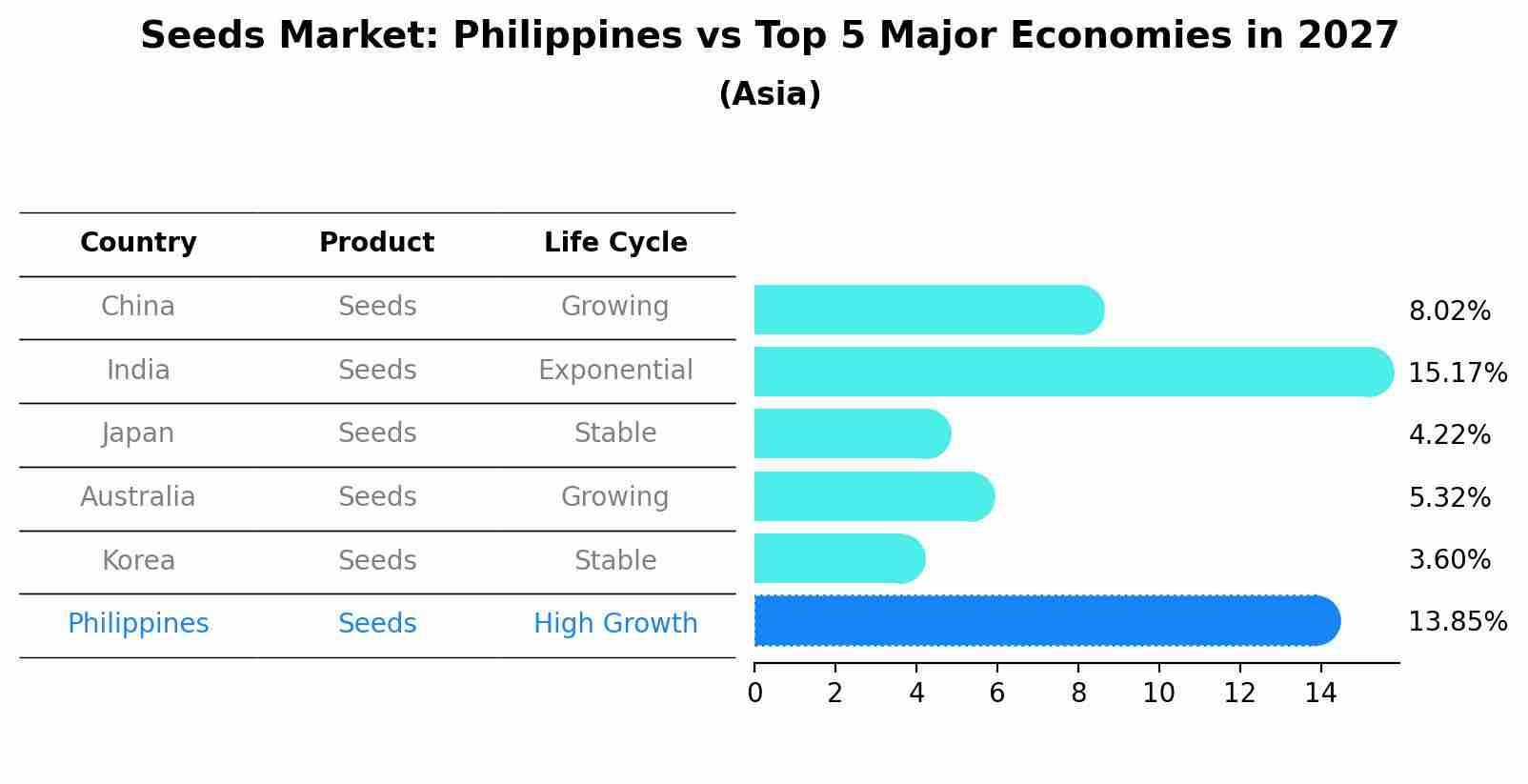Philippines Seeds Market (2025-2031) Outlook | Companies, Growth, Trends, Share, Analysis, Forecast, Revenue, Industry, Value & Size
| Product Code: ETC384689 | Publication Date: Aug 2022 | Updated Date: Nov 2025 | Product Type: Market Research Report | |
| Publisher: 6Wresearch | Author: Ravi Bhandari | No. of Pages: 75 | No. of Figures: 35 | No. of Tables: 20 |
Philippines Seeds Market Top 5 Importing Countries and Market Competition (HHI) Analysis
The Philippines seeds import market in 2024 continued to be dominated by key exporting countries such as the USA, Canada, China, Malaysia, and Denmark. Despite a negative compound annual growth rate (CAGR) of -4.96% from 2020-2024, the market experienced a significant decline in growth rate from 2023-2024 at -40.21%. The high Herfindahl-Hirschman Index (HHI) indicates a concentrated market, highlighting the strong presence of these top exporting nations. This data suggests a challenging landscape for seed importers in the Philippines, with potential implications for market competition and pricing dynamics.

Seeds Market: Philippines vs Top 5 Major Economies in 2027 (Asia)
In the Asia region, the Seeds market in Philippines is projected to expand at a high growth rate of 13.85% by 2027. The largest economy is China, followed by India, Japan, Australia and South Korea.

philippines seeds market Synopsis
The Philippines seeds market offers a diverse range of agricultural products to cater to the country`s farming needs. With a wide variety of crops grown across different regions, the seeds market plays a pivotal role in providing the foundation for agricultural activities. Farmers can access a plethora of options, from traditional seeds to genetically modified ones, enabling them to select the most suitable seeds for their specific requirements. This market`s growth is influenced by factors such as changing climate patterns, technological advancements in agriculture, and the demand for high-yield and disease-resistant crops.
Drivers of the Market
The Philippines` seeds market is driven by a growing demand for improved crop varieties that offer higher yields, resistance to pests and diseases, and adaptation to changing climatic conditions. The government`s initiatives to enhance agricultural productivity through modern techniques and genetically modified crops have also contributed to the expansion of this market.
Challenges of the Market
The Philippines seeds market encounters challenges related to seed quality, access to improved varieties, and regulatory frameworks. Ensuring that farmers have access to high-quality seeds that offer good yields and resilience to pests and diseases is vital for agricultural productivity. Navigating seed certification and regulatory requirements, while promoting the adoption of modern seed technologies, presents challenges for both the public and private sectors.
COVID-19 Impact on the Market
The COVID-19 pandemic affected the Philippines seeds market by disrupting agricultural activities and supply chains. Movement restrictions impacted the availability of labor for planting and harvesting, affecting seed demand. Additionally, supply chain disruptions and logistical challenges impacted the distribution of seeds and agricultural inputs. The crisis highlighted the importance of resilient supply chains and technological solutions in ensuring food security. As agriculture activities resume and the market adapts, investments in agtech and sustainable farming practices are expected to gain significance.
Key Players in the Market
The seeds market in the Philippines encompasses a wide range of crops. Key players like Monsanto Philippines (now part of Bayer Crop Science) and Syngenta Philippines contribute to the agricultural sector by providing high-quality seeds for various crops. They support farmers with improved hybrid and genetically modified seeds that enhance crop yields and quality.
Key Highlights of the Report:
- Philippines Seeds Market Outlook
- Market Size of Philippines Seeds Market, 2024
- Forecast of Philippines Seeds Market, 2031
- Historical Data and Forecast of Philippines Seeds Revenues & Volume for the Period 2021-2031
- Philippines Seeds Market Trend Evolution
- Philippines Seeds Market Drivers and Challenges
- Philippines Seeds Price Trends
- Philippines Seeds Porter's Five Forces
- Philippines Seeds Industry Life Cycle
- Historical Data and Forecast of Philippines Seeds Market Revenues & Volume By Type for the Period 2021-2031
- Historical Data and Forecast of Philippines Seeds Market Revenues & Volume By Genetically Modified (GM) Seed for the Period 2021-2031
- Historical Data and Forecast of Philippines Seeds Market Revenues & Volume By Conventional Seed for the Period 2021-2031
- Historical Data and Forecast of Philippines Seeds Market Revenues & Volume By Crop for the Period 2021-2031
- Historical Data and Forecast of Philippines Seeds Market Revenues & Volume By Field Crops for the Period 2021-2031
- Historical Data and Forecast of Philippines Seeds Market Revenues & Volume By Fruit & Vegetable Crops for the Period 2021-2031
- Historical Data and Forecast of Philippines Seeds Market Revenues & Volume By Availability for the Period 2021-2031
- Historical Data and Forecast of Philippines Seeds Market Revenues & Volume By Commercial Seeds for the Period 2021-2031
- Historical Data and Forecast of Philippines Seeds Market Revenues & Volume By Saved Seeds for the Period 2021-2031
- Historical Data and Forecast of Philippines Seeds Market Revenues & Volume By Seed Treatment for the Period 2021-2031
- Historical Data and Forecast of Philippines Seeds Market Revenues & Volume By Treated for the Period 2021-2031
- Historical Data and Forecast of Philippines Seeds Market Revenues & Volume By Untreated for the Period 2021-2031
- Historical Data and Forecast of Philippines Seeds Market Revenues & Volume By Seed Trait for the Period 2021-2031
- Historical Data and Forecast of Philippines Seeds Market Revenues & Volume By Herbicide Tolerant for the Period 2021-2031
- Historical Data and Forecast of Philippines Seeds Market Revenues & Volume By Insecticide Resistant for the Period 2021-2031
- Historical Data and Forecast of Philippines Seeds Market Revenues & Volume By Other Stacked Traits for the Period 2021-2031
- Philippines Seeds Import Export Trade Statistics
- Market Opportunity Assessment By Type
- Market Opportunity Assessment By Crop
- Market Opportunity Assessment By Availability
- Market Opportunity Assessment By Seed Treatment
- Market Opportunity Assessment By Seed Trait
- Philippines Seeds Top Companies Market Share
- Philippines Seeds Competitive Benchmarking By Technical and Operational Parameters
- Philippines Seeds Company Profiles
- Philippines Seeds Key Strategic Recommendations
Frequently Asked Questions About the Market Study (FAQs):
- Single User License$ 1,995
- Department License$ 2,400
- Site License$ 3,120
- Global License$ 3,795
Search
Thought Leadership and Analyst Meet
Our Clients
Related Reports
- Canada Oil and Gas Market (2026-2032) | Share, Segmentation, Value, Industry, Trends, Forecast, Analysis, Size & Revenue, Growth, Competitive Landscape, Outlook, Companies
- Germany Breakfast Food Market (2026-2032) | Industry, Share, Growth, Size, Companies, Value, Analysis, Revenue, Trends, Forecast & Outlook
- Australia Briquette Market (2025-2031) | Growth, Size, Revenue, Forecast, Analysis, Trends, Value, Share, Industry & Companies
- Vietnam System Integrator Market (2025-2031) | Size, Companies, Analysis, Industry, Value, Forecast, Growth, Trends, Revenue & Share
- ASEAN and Thailand Brain Health Supplements Market (2025-2031) | Strategy, Consumer Insights, Analysis, Investment Trends, Opportunities, Growth, Size, Share, Industry, Revenue, Segments, Value, Segmentation, Supply, Forecast, Restraints, Outlook, Competition, Drivers, Trends, Demand, Pricing Analysis, Competitive, Strategic Insights, Companies, Challenges
- ASEAN Bearings Market (2025-2031) | Strategy, Consumer Insights, Analysis, Investment Trends, Opportunities, Growth, Size, Share, Industry, Revenue, Segments, Value, Segmentation, Supply, Forecast, Restraints, Outlook, Competition, Drivers, Trends, Demand, Pricing Analysis, Competitive, Strategic Insights, Companies, Challenges
- Europe Flooring Market (2025-2031) | Outlook, Share, Industry, Trends, Forecast, Companies, Revenue, Size, Analysis, Growth & Value
- Saudi Arabia Manlift Market (2025-2031) | Outlook, Size, Growth, Trends, Companies, Industry, Revenue, Value, Share, Forecast & Analysis
- Uganda Excavator, Crane, and Wheel Loaders Market (2025-2031) | Strategy, Consumer Insights, Analysis, Investment Trends, Opportunities, Growth, Size, Share, Industry, Revenue, Segments, Value, Segmentation, Supply, Forecast, Restraints, Outlook, Competition, Drivers, Trends, Demand, Pricing Analysis, Competitive, Strategic Insights, Companies, Challenges
- Rwanda Excavator, Crane, and Wheel Loaders Market (2025-2031) | Strategy, Consumer Insights, Analysis, Investment Trends, Opportunities, Growth, Size, Share, Industry, Revenue, Segments, Value, Segmentation, Supply, Forecast, Restraints, Outlook, Competition, Drivers, Trends, Demand, Pricing Analysis, Competitive, Strategic Insights, Companies, Challenges
Industry Events and Analyst Meet
Whitepaper
- Middle East & Africa Commercial Security Market Click here to view more.
- Middle East & Africa Fire Safety Systems & Equipment Market Click here to view more.
- GCC Drone Market Click here to view more.
- Middle East Lighting Fixture Market Click here to view more.
- GCC Physical & Perimeter Security Market Click here to view more.
6WResearch In News
- Doha a strategic location for EV manufacturing hub: IPA Qatar
- Demand for luxury TVs surging in the GCC, says Samsung
- Empowering Growth: The Thriving Journey of Bangladesh’s Cable Industry
- Demand for luxury TVs surging in the GCC, says Samsung
- Video call with a traditional healer? Once unthinkable, it’s now common in South Africa
- Intelligent Buildings To Smooth GCC’s Path To Net Zero


















